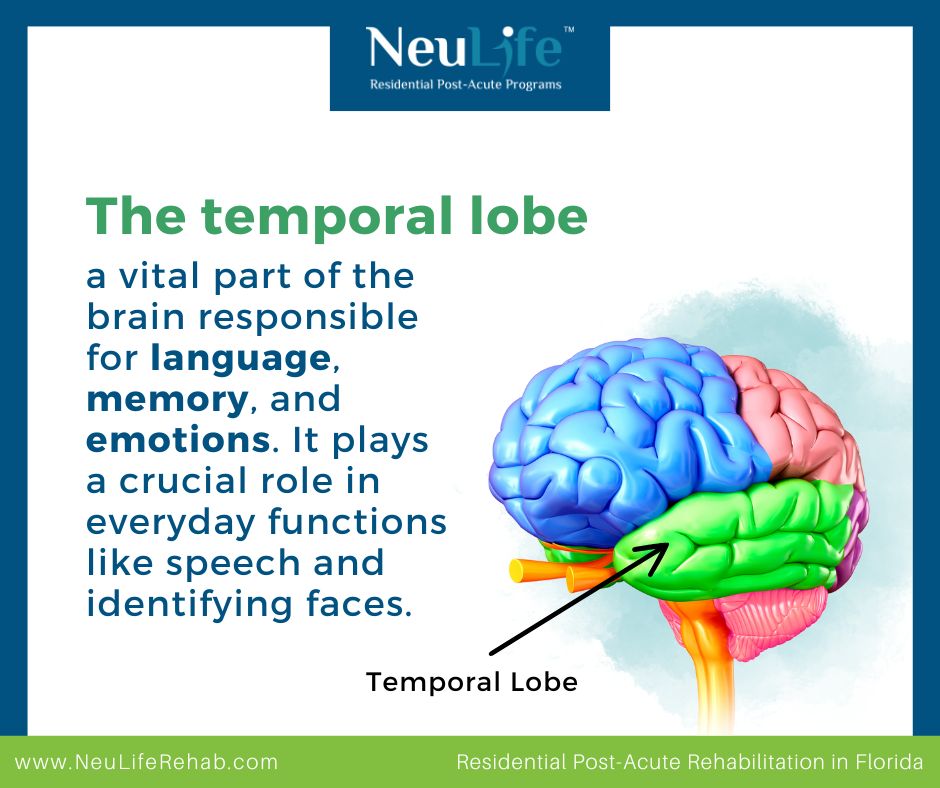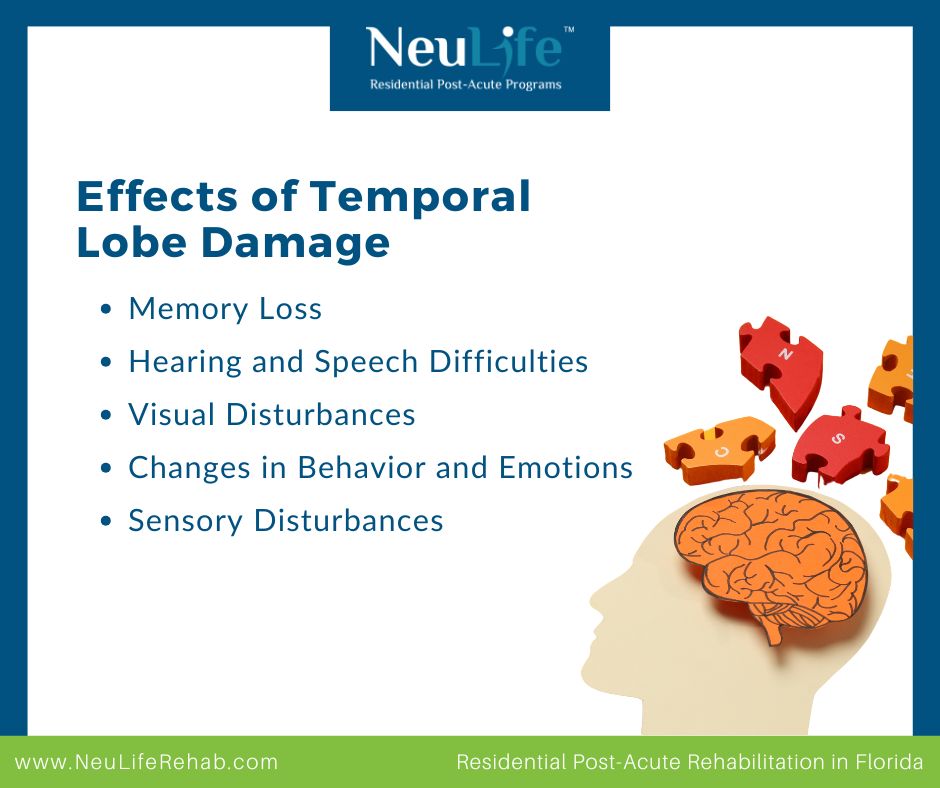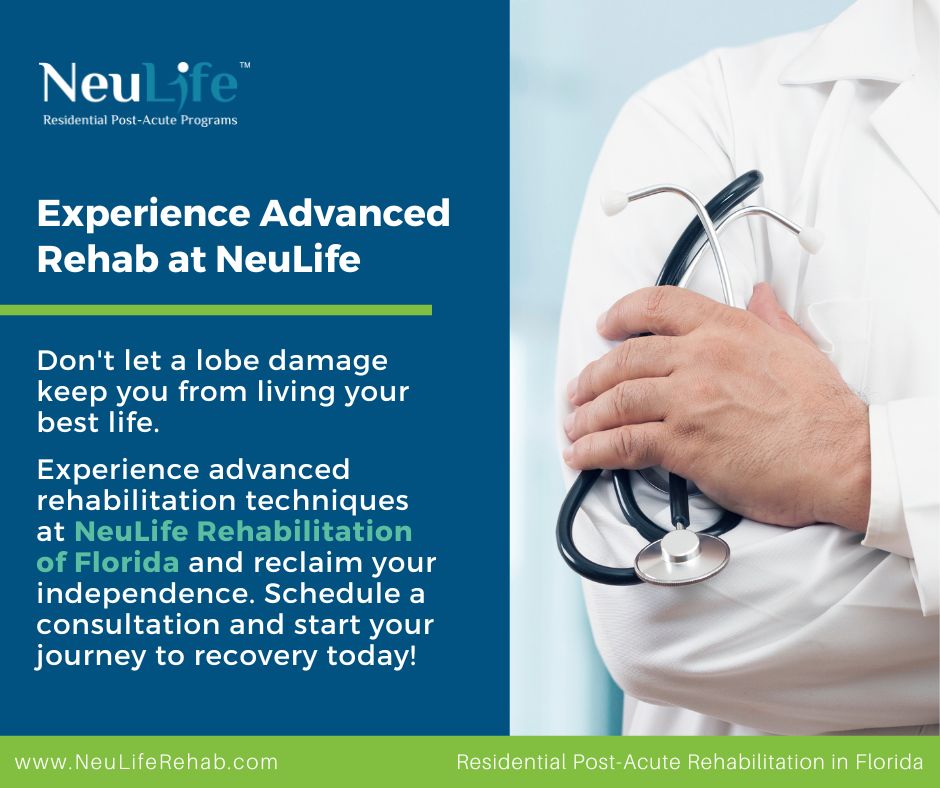The temporal lobe, located in the brain's cerebral cortex, plays a crucial role in memory, language, emotion, and some aspects of hearing and vision. Damage to this vital area can have significant and lasting effects on an individual's cognitive and emotional functioning.
Whether from a traumatic brain injury, stroke, or other medical condition, understanding how temporal lobe damage can impact a person's life is paramount to providing effective treatment and supporting their recovery.
In this blog, we will dive into the causes and symptoms of temporal lobe damage, explore various treatment options, and discuss the recovery process. Moreover, we will also discuss how NeuLife Rehabilitation of Florida can help those suffering from temporal lobe damage to regain control of their lives.

The temporal lobe is located on the side of the brain, just behind the ears. It is one of the four cerebral cortex lobes, along with the frontal, parietal, and occipital lobes. The primary function of the temporal lobe includes:
The temporal lobe processes auditory information, including sound recognition and speech perception. It contains the primary auditory cortex, which receives signals from the ears and interprets them as meaningful sounds. This information then travels to other brain parts for further processing, allowing us to understand and respond to what we hear.
The temporal lobe also plays a critical role in language processing. It is responsible for understanding and producing spoken language. The left temporal lobe, in particular, is involved in speech production, while the right temporal lobe is responsible for understanding the emotions conveyed through speech.
The temporal lobe is closely connected to the hippocampus, a structure located deep in the temporal lobe responsible for forming and storing memories. Together, they play a crucial role in consolidating and retrieving long-term memories. This brain region is also responsible for recognition memory, which helps us identify objects, people, and places based on previous experiences.
The temporal lobe also plays a role in regulating our emotions. The amygdala, a small structure located within the temporal lobe, is responsible for processing and responding to emotional stimuli. It helps us recognize and respond appropriately to emotions such as fear, pleasure, and anger.

Temporal lobe damage can have a significant impact on a person's life. The effects can vary depending on the extent and location of the damage. Some common effects include:
The temporal lobe plays a crucial role in memory formation and retention. Therefore, damage to this area can lead to memory loss, making it difficult to recall past events and retain new information.
As mentioned earlier, the temporal lobe is responsible for processing auditory information. Damage to this area can cause difficulties in understanding and interpreting speech, making it hard for a person to communicate effectively.
Vision is also controlled by the temporal lobe, specifically the occipitotemporal cortex. Damage to this area can result in visual disturbances, such as difficulty recognizing faces or objects.
The temporal lobe is connected to the limbic system, the part of the brain responsible for regulating emotions and behavior. Damage to this area can lead to mood, personality, and behavior changes.
Damage to the temporal lobe can also cause sensory disturbances, such as changes in the perception of touch, smell, and taste. This can significantly affect a person's daily life, making it difficult to perform basic tasks.
The treatment for temporal lobe damage depends on the underlying cause and the severity of the damage. Some common treatments include:
Medications, such as anticonvulsants and antidepressants, may be prescribed to manage seizures and mood changes associated with temporal lobe damage. These medications help to control symptoms and improve the quality of life for those with this condition.
In some cases, surgery may be recommended to remove the damaged part of the temporal lobe. This can help reduce seizures and improve symptoms in individuals with severe temporal lobe damage.
Psychotherapy, such as cognitive-behavioral therapy, can help individuals with temporal lobe damage cope with changes in behavior and emotions. It can also assist in managing memory and communication difficulties.
Rehabilitation programs, such as those offered at NeuLife Rehabilitation of Florida, can help individuals with temporal lobe damage regain their independence and improve their quality of life. These programs focus on maximizing functioning and adapting to new ways of performing daily tasks.
The recovery process for temporal lobe damage can vary from person to person, depending on the severity of the damage and the treatments they receive. In some cases, individuals may experience a full recovery, while others may require ongoing therapy and support.
The recovery process may involve:
Physical rehabilitation can help individuals with sensory and motor difficulties caused by temporal lobe damage. It includes exercises and therapies to improve strength, coordination, and balance.
Occupational therapy can assist individuals in relearning daily tasks and adapting to any physical or cognitive impairments caused by temporal lobe damage. It aims to improve functional skills and promote independence.
Speech therapy can help individuals with communication difficulties caused by temporal lobe damage. It focuses on improving speech, language, and swallowing abilities.
Coping with the effects of temporal lobe damage can be emotionally challenging. Therefore, emotional support from family, friends, or a professional therapist can significantly aid recovery.
If you or a loved one is struggling with temporal lobe damage, rest assured that you are not alone in this journey. At NeuLife Rehabilitation in Florida, we recognize the challenges and difficulties associated with this condition.
Our neuro rehabilitation services are designed to cater to the unique needs of each individual, helping them regain their independence and enhance their overall well-being. Our post-acute rehabilitation center has successfully aided numerous patients with temporal lobe damage in their recovery.
Our team of experienced healthcare professionals, including physicians, therapists, and nurses, is committed to providing exceptional care and support to our patients. We invite you to schedule a tour and visit our facility to see how our services can benefit you or your loved one on the road to healing.
Interested in learning more about brain injury and recovery? Check out our latest blogs on "What Parts of the Brain are Affected by TBI?" and "Frontal Lobe Functions: What to Expect and How to Recover." Our experienced team is dedicated to providing valuable resources and information to those affected by temporal lobe damage.
At NeuLife, we also specialize in TBI rehabilitation, stroke patient rehab, and other brain injury treatments. Let us be a part of your healing journey. Contact us to learn more about our services and how we can assist you or your loved one recover from temporal lobe damage.

***
The material on this site is for informational purposes only and DOES NOT CONSTITUTE THE PROVIDING OF MEDICAL ADVICE, and is not intended to be a substitute for independent professional medical judgment, advice, diagnosis, or treatment. Always seek the advice of your physician or other qualified healthcare provider with any questions or concerns you may have regarding your health.

We know that choosing the next step in your recovery from a catastrophic illness or injury is complex. Together, we can help you take the next step.
Contact us with any questions today.